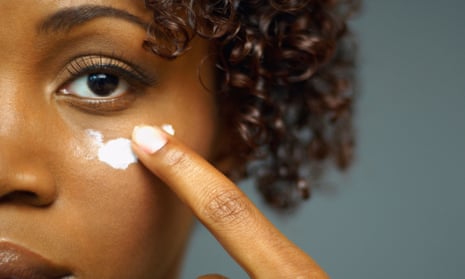How would you feel about putting a lovely dollop of formaldehyde on your nails? No? Well, perhaps I could interest you in a sprinkling of asbestos for your skin? Hmm, tricky customer, eh? OK, surely you couldn’t object to some coal tar on your eyelids, to really make them pop. Oh, come on, who wouldn’t risk a little light cancer for a really banging shade of eyeshadow? You wouldn’t? Too bad. In our brave new Brexit world, where EU legislation is no longer in force, and we are forced to accept trade deals on Trump’s terms, expect all these known carcinogens and more to be appearing on a beauty shelf near you.
Since 2007 UK consumers have been protected by the EU’s “precautionary principle”. Essentially, the EU doesn’t think that chemicals that have been linked to cancer and birth defects belong in cosmetics, and so they are banned from use in consumer products. And who could argue with that?
Well, the US, actually, where a chemical is only banned if it poses an “unreasonable risk”. Whereas in the EU there is no “safe” level of exposure to a proven carcinogen, the US system, is “steeped in quantitative risk assessment”, says Mike Belliveau, executive director at the Environmental Health Strategy Center.
The result is a major disparity in the level of consumer protection from hazardous chemicals. The EU bans 1,328 chemicals from use in cosmetics – including formaldehyde, asbestos and coal tar – that are known or suspected to cause cancer, genetic mutation, reproductive harm or birth defects. The US Food & Drugs Administration (FDA), by comparison, has only banned or restricted 11.
Of course you could argue that adults can make their own choices about what to use on their own bodies. If I want to put asbestos on my face, then the American Dream says that I should be free to do so. Down with the nanny state!
The thing is that only works if consumers are able to make meaningful choices, based on adequate information. And in the US, they are not, thanks to the handy “fragrance loophole”. This legislation, intended as a way of protecting trade secrets, in fact means that hundreds of chemicals linked to cancer, birth defects and hormone disruption can be smuggled into all sorts of personal care products under the catch-all, innocent-sounding “fragrance”.
And don’t think you can bypass these chemicals by simply buying “fragrance-free” products: the FDA does not regulate the terms “fragrance free” or “unscented” and a recent study found that 45% of products marketed as “fragrance free” in the US were in fact not fragrance free at all.
The multibillion-dollar US fragrance and cosmetics industry hit back at such concerns, saying that it tests its products for safety. But those studies have never been published in peer-reviewed scientific journals, and the industry refuses to publicly release the safety data. So we just have to take an industry that has spent millions of dollars lobbying against more transparent labelling requirements on trust. Rather than, as in the EU, having a right to know what it is we’re putting on our bodies.
But this right is at risk if we lose access to EU data – a major concern given how reliant we have been historically on other EU countries doing chemicals testing for us. Even more worrying, our government has made no commitment to keep aligned with EU chemical rules, leaving us at risk of becoming a dumping ground for hazardous chemicals – a future that was heralded last month by a civil servant who explained that the UK would consider EU decisions, but also “look at what the US does”. Welcome to Brexit Britain, where the chicken is chlorinated, and the cosmetics could be carcinogenic.
This wasn’t on the ballot paper in 2016. Instead we were like US consumers: asked to make a choice while being denied adequate information. This is not what democracy looks like. Now that the true costs of Brexit are emerging, the honourable and democratic thing is to give people a final say. Theresa May should stop blackmailing MPs with threats of a no deal, and instead bow to the will of the people, and give us a people’s vote.
